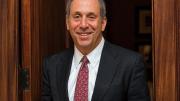Research universities change the world by taking the long view. Consider recombinant DNA. Fifty years ago, the possibility of manipulating and editing the building blocks of life had just been realized in laboratories devoted to curiosity-driven scholarship. The promise of groundbreaking applications across a variety of fields ignited imaginations. All that was missing was technology to help fuel advances, and Harvard and MIT, among other institutions, collaborated to bridge the gap. The result of early investments in ambitious ideas is literally all around us in Massachusetts, where a thriving biotech industry continues to attract top talent as it makes an outsized economic impact—and shapes the livelihoods and lives of people across the country and around the world.
Where will scientific achievement boom in the next half century? There is no one way to answer that question, but Harvard is venturing a guess: quantum science and engineering. Today, some 30 groups across the University comprising more than 400 researchers are pushing the boundaries of what we know about energy and matter. Their various pursuits are driving toward ambitious ends: the measurement, engineering, and control of matter at the single-atom and single-quantum scale. These capabilities will spur extraordinary innovations in computing, cryptography, networking, materials, and sensors, ushering in the second quantum revolution. If you are unfamiliar with the first, just look to the ubiquitous technology that makes modern life possible, and recall that the atomic clock, laser, and transistor gave way to computers, fiber-optic communication, and global positioning systems.
Our willingness to advance fundamental science, basic engineering, and computational principles now will speed the next revolution and enable progress we cannot yet imagine. In 2018, we established the Harvard Quantum Initiative in Science and Engineering (HQI) to organize, support, and expand our efforts in this critical area. It has quickly become a hub of activity on our campus and beyond, convening leaders in the field, attracting faculty members to our ranks, and strengthening and developing research partnerships with other institutions of higher education, among them MIT, as well as with government and industry. At the same time, the University has attracted significant philanthropic support to build momentum, including a renovation of 60 Oxford Street to meet demand for state-of-the-art infrastructure and space for a growing community of scholars.
A nutrient-rich environment for quantum depends at least as much on teaching as on research, and we are committed to nurturing talent that will enrich our efforts for generations. The HQI Prize Postdoctoral Fellowship has already brought fifteen outstanding young scientists to Harvard, and our new PhD program in quantum science and engineering began taking applications this semester. It is one of the first programs of its kind, and its integrated curriculum—at the intersection of physics, chemistry, and engineering—is designed expressly to speed proficiency in an ever-shifting intellectual landscape. Students will also be trained in communication and introduced to a variety of professional opportunities, including in the private sector, to maximize the impact of their expertise and skills.
The potential commercial applications of quantum theory may be years away, but they are huge. Harvard and MIT are again collaborating to ensure that scientific progress and economic progress have their roots in the United States and, more specifically, in Cambridge. The quantum race is a global one. Our competitors are supported by governments that understand that the swiftest route to a thriving economy runs through university laboratories. Leading in the development of systems and devices that are faster, more precise, and more secure than anything we can imagine today is in the national interest. Quantum science and engineering is more than just a promising area of science and technology. It is the future.









